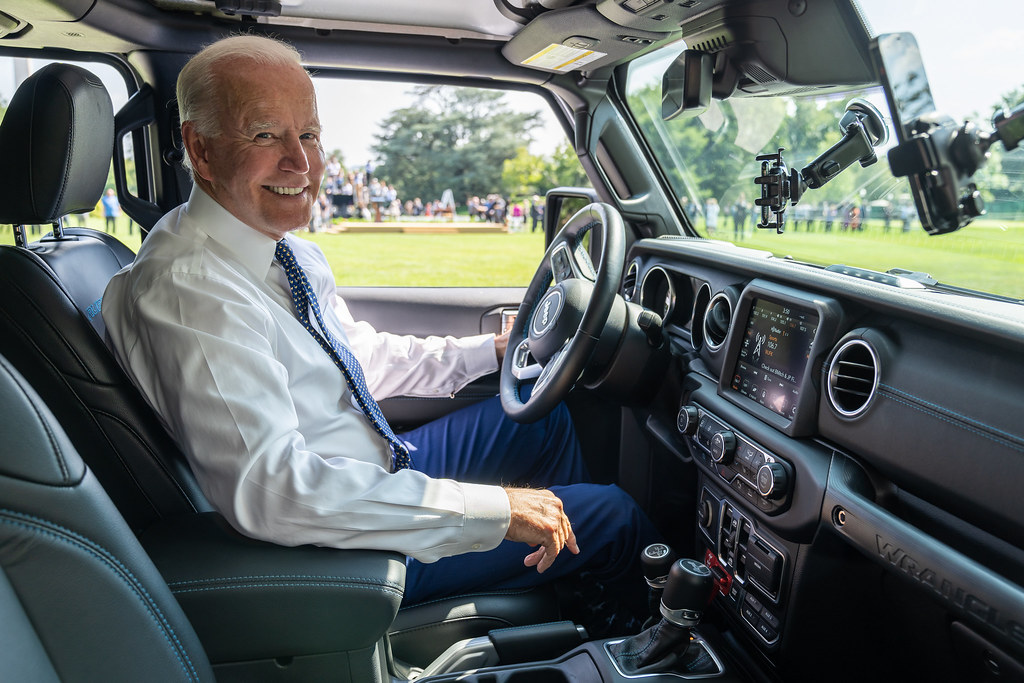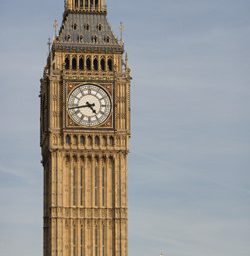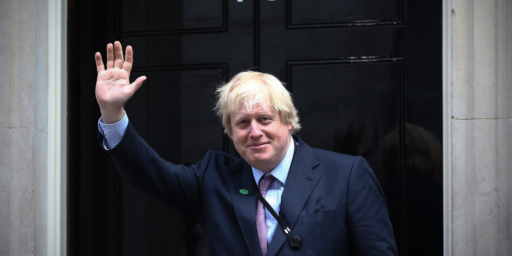The Politics of An Auto Strike
The President's support for labor and aggressive action on climate change are in tension.

The United Auto Workers began a strike against the Big 3 auto companies at midnight, with the two sides miles apart in negotiations. While it seems implausible to me that this will impact a presidential election 14 months from now, some argue otherwise.
The best articulation of the target I’ve seen comes from WaPo White House Bureau Chief Toluse Olorunnipa (“Biden faces a moment of peril as UAW threatens broad strike“):
President Biden has simultaneously called himself the “most pro-union president in history” and the most effective environmental champion to occupy the Oval Office. As he stakes his reelection bid on his handling of the economy, those at-times-conflicting priorities are being challenged by a looming autoworker strike with outsize political ramifications.
The White House has been monitoring closely as Detroit’s big automakers and the United Auto Workers engage in acrimonious negotiations, with the laborers threatening to strike if an agreement is not reached before their current contract expires at 11:59 p.m. Thursday. A full or partial strike could send shock waves through the economy while also calling into question’s Biden’s pledge to create a “win-win” transition to a clean-energy future.
While the president is not a direct party to the negotiations, the latest labor dispute is shaping up to be one of the most politically precarious of his term. With the key presidential battleground state of Michigan likely to be the most impacted by a work stoppage, Biden’s allies are hoping to avoid a strike while also pursuing an elusive endorsement from the UAW.
“He is not directly involved but he certainly has a strong interest in seeing a settlement that both sides can live with,” said Harley Shaiken, a labor professor at the University of California at Berkeley. “A strike makes things much more complicated and it raises the specter of political damage when Biden can least afford it and would most like to avoid it.”
[…]
With the deadline approaching, UAW’s fiery new president Shawn Fain has not echoed Biden’s optimism, saying the union’s roughly 150,000 automotive members are ready to walk off the job if their demands are not met in the next two days. Among other things, the workers have called for a 36 percent pay hike over four years and the restoration of defined-benefit pension plans.
Even a partial strike could destabilize an industry that contributes about 3 percent of the nation’s gross domestic product and deliver a blow to the economies of states in the Midwest and beyond. Economists have predicted that a prolonged strike could eventually lead to higher car prices, a major driver of the surge in inflation under Biden that has only recently cooled off.
[…]
Biden’s push to help the auto industry transition to clean energy technologies has become a key sticking point for autoworkers, who fear the shift to electric vehicles will mean fewer jobs and lower pay. The UAW — which has pointedly withheld an endorsement of Biden’s reelection — has specifically chided the administration for facilitating billions of dollars in tax incentives and loans for automakers without requiring them to share the benefits with union laborers.
Fain’s harsh comments about Biden’s approach to the EV transition earlier this year created a sense of tension with the White House, which did not know the upstart union leader well before his March election, according to a senior administration official who spoke on the condition of anonymity to discuss internal deliberations. Still, Biden invited Fain for a half-hour meeting in the Oval Office this summer and relations have improved in recent months, the official said.
Biden, who sought unsuccessfully to include certain pro-union provisions in the Inflation Reduction Act, has publicly urged the carmakers and electric battery companies to hire union workers and pay them a fair wage.
“We’re going to transition to an electric vehicle future made in America — and it will protect and expand good union jobs,” Biden wrote on X, formerly known as Twitter, on Tuesday.
But it’s not clear how much power the president has to force the two sides into an agreement, as he did with the railroad worker contract talks last year. The White House’s intervention in the rail dispute angered many of Biden’s union allies and some labor officials have requested him to stay out of the current talks.
The president, who returned to Washington on Monday night from a trip to Asia, has not publicly endorsed the UAW’s list of specific demands or criticized the auto companies’ offers. White House officials have not always been kept apprised of the various offers and counteroffers on the table during the multiparty negotiations, one official said. It has at times been difficult to parse which of Fain’s demands are top priorities and which can be tabled, the official said.
[…]
The carmakers have warned that acceding to the UAW’s demands would make it difficult for them to compete against competitors like Tesla and foreign auto companies that do not have unionized workforces.
“We will not make a deal that endangers our ability to invest, grow and share profits with our employees,” Ford President and CEO Jim Farley said last month in a statement. “That would mortgage our future and would be harmful to everyone with a stake in Ford, including our valued UAW workers.”
[…]
White House officials have shown some openness to that sentiment, especially as Biden tries to boost domestic manufacturing and help U.S. companies compete with foreign competitors.
But some progressive Democrats have blasted the companies for taking in billions of dollars in taxpayer funds while rebuffing employees’ call for more equitable pay. They have urged party leaders to take a more unequivocal stance behind the workers.
“My belief is that the Democratic Party, from the president on down, need to stand in solidarity with Shawn Fain and the workers,” said Rep. Ro Khanna (D-Calif.), who added that Biden has been clear when he has spoken out on labor issues. “There are not two sides to this issue. There is the issue of workers being paid fairly, especially after we have provided billions of taxpayer handouts and subsidies to the Big Three companies.”
Biden, who often proclaims on the trail that “unions built the middle class,” has made selling “Bidenomics” a key piece of his reelection pitch. He has touted the Inflation Reduction Act, with its clean-energy tax credits for consumers and companies, as crucial to creating well-paying jobs and reviving America’s manufacturing sector.
But Republicans have been hammering Biden on the economy, and several GOP presidential contenders have sought to turn his clean-energy push into a political liability. Former president Donald Trump has made a direct appeal to UAW’s workers, calling on them to endorse him and reject Biden’s climate-focused “war on the U.S. auto industry.”
“Joe Biden’s Electric Vehicle mandate will murder the U.S. auto industry and kill countless union autoworker jobs forever, especially in Michigan and the Midwest,” Trump’s campaign said in a statement last week.
While it is unlikely that the UAW will endorse Trump — Fain has publicly pilloried the former president — the group’s unwillingness to back Biden has emerged as a political headache for his campaign. Most other major unions, including the AFL-CIO and International Brotherhood of Electrical Workers, have given the president early endorsements and public support for his pro-union image.
The UAW, which endorsed Biden in 2020, has indicated that the president’s approach to electric vehicles will play a major role in its decision about the 2024 race.
“Our endorsements are going to be earned and not freely given,” Fain told CNN. “Actions are going to dictate endorsements so we’ll see how things continue to play out. We have a lot of issues to resolve. … There’s a lot with the EV transition that has to happen. There’s hundreds of billions of our taxpayer dollars that are helping fund this and workers cannot continue to be left behind in that equation.”
Biden won some plaudits from autoworkers last month when his Energy Department unveiled $12 billion in grants and loans that auto companies could use to revamp existing factories into electric vehicle plants. The grant program plans to prioritize companies that have collective bargaining agreements and pay relatively high wages, the department said. Fain has praised those provisions.
But the impending strike could have a bigger — and more immediate — impact, according to economists.
A full strike on all three automakers could cost the U.S. economy more than $5 billion in 10 days, according to Michigan consulting firm Anderson Economic Group. A partial strike would be enough to disrupt supply chains and hit consumers.
While Biden has been able to navigate a growing number of labor disputes in the past year — including threatened strikes by UPS employees, dockworkers on the West Coast and rail workers — a work stoppage at the Big Three automakers could leave lasting political damage ahead of 2024, said Shaiken, the labor professor. In states like Michigan, which Trump won by less than 11,000 votes in 2016, the election could be decided by the labor group that endorsed Biden in 2020 but has stayed neutral so far about his reelection.
“It gives the possibility of UAW workers simply staying home,” he said. “That could have a very significant impact.”
The Economist (“Joe Biden’s love of unions runs into a giant strike“) notes that this comes amidst the largest wave of strikes in decades and a general sense of class turmoil.
It is sometimes said that Americans are not class-conscious. A few minutes of listening to Shawn Fain, president of the United Auto Workers, one of the country’s biggest unions, ought to put that notion to rest. “The very existence of billionaires shows us that we have an economy that is working for the benefit of the few and not the many,” he told uaw members in a recent live-stream. His theme was that workers were losing out while companies were profiting. “Why is that?” he asked. “So another asshole can make enough money to shoot himself to the moon?”
[…]
When strikes have been averted recently, the terms have been favourable for workers. ups, a delivery company, agreed in July to lift pay and benefits for its drivers to $170,000. Some in the labour movement think they are just getting started. Or as Mr Fain says: “Our fight is not just for ourselves but for every worker.”
That could end up posing a conundrum for Joe Biden. A favourite boast is that he is the most pro-union president in American history. Academics would debate that, with many giving the nod to Franklin Roosevelt (in power when the right to collective bargaining was enshrined in law). Few, however, would object to calling Mr Biden the most pro-union president in the past 80 years. Not only has he repeatedly voiced staunch support for workers, he has overseen funding commitments, rule changes and personnel appointments that are handing more power to unions—a profound shift after decades in which they were regularly undermined. But a wave of strikes, with the potential to inflict damage on the economy, may test the depths of Mr Biden’s fondness for unions.
What makes the work stoppages so remarkable is that American unions have been in decline for decades, in effect reducing the pool of potential strikers. Just 6% of private-sector workers are in unions today, down from about 30% in 1970. Could the decline now be over? Flickers of a rebound in labour activism were first visible in 2018 and 2019, when the total numbers of American workers on strike hit three-decade highs. Most were public-sector employees, especially teachers.
Strikes this year have spanned a wider variety of sectors: entertainment, logistics, manufacturing, construction, cleaning services and more. “The discontent is comprehensive. You see workers in industries that have never been unionised,” says Kent Wong of the University of California, Los Angeles. Perhaps the biggest labour headlines since 2020 have come from the successes of workers at an Amazon warehouse in New York and at about 350 Starbucks cafés (and counting) in forming unions. Liz Shuler, head of afl-cio, America’s largest federation of unions, describes it as “the awakening happening in this country”.
And, despite the tension with UAW, Biden’s policies are objectively pro-union.
His industrial policy—roughly $1trn in subsidies for semiconductors, electric vehicles and renewable energy—has been crafted with workers in mind. Much of the funding is contingent on commitments to pay fair wages. Some of the tax breaks have also included wording that companies should remain neutral when their workers try to organise unions. That proved important at Blue Bird, a school-bus maker in Georgia, a state hostile to unions. In May a majority of workers there voted to join a union, a breakthrough for the labour movement in the South.
The regulatory landscape has also changed under Mr Biden. His appointees to the National Labour Relations Board (nlrb), which enforces labour law, have made it easier for workers to hold union elections and harder for companies to block them. Not only has the nlrb overturned company-friendly rules passed under Donald Trump; it also rejected a standard that had stood since 1971 allowing bosses to challenge whether unions truly command majority support. Jennifer Abruzzo, the nlrb’s general counsel, appointed by Mr Biden, is lauded by labour leaders as their fiercest champion in years.
As to the politics:
Surveys show that nearly 70% of Americans now approve of unions, close to a six-decade high (though unions’ loss of clout over the years may help to account for their popularity today, because few people have experienced the fallout from work stoppages). And unions mostly approve of Mr Biden: he has already received an endorsement from the afl-cio, its earliest endorsement ever for a presidential candidate. Many of their rank-and-file may still prefer Mr Trump, but Mr Biden carried a majority of union households in the 2020 election.
However, if Mr Biden likes unions, it is much less clear that he likes strikes. Unions have succeeded not because companies see win-win outcomes in dealing with them but because they fear the consequences of not doing so. “It’s a struggle. It’s a zero-sum game,” says Nelson Lichtenstein, a labour historian. An impasse at Starbucks supports his point. Although hundreds of cafés have unionised, workers say the company refuses to bargain with them. “It would require some kind of chaos, doing real damage to the Starbucks reputation, to change that,” he says.
Mr Biden has shown little stomach for chaos. In December he approved a bill to force rail workers to sign a contract and stay on the job, averting a strike that would have caused logistical problems throughout the country. He does not have the same legal authority to forestall a uaw work stoppage. But a strike at the Big Three would cause big losses for the carmakers that would, over time, cascade to other manufacturing firms in Michigan, a swing state in the 2024 election.
As noted at the outset, my hunch is that the strike will be over relatively soon and not have much impact at all on the 2024 elections.






I suspect that the “EVs hurt unions” is just right wing FUD, as it’s not apparent why building electric motors would be inherently less amenable to unionization then building ICEs, but does anyone know a legit basis for this claim?
@Stormy Dragon: I think it has more to do with the automakers taking advantage of the change in technology to move more work onto non-union suppliers or sources. Engine plants have long been unionized. Plants that make batteries and electric motors are not, for the most part.
@Stormy Dragon:
Hardly good for unions when the company is losing money
Someone should press Trump whether he supports the union’s goals of more pay, less hours, pensions, etc. for the working class, his supposed constituency. Shouldn’t let him get away with BS culture war issues like EVs vs ICEs.
Things we take fro granted today, like the 40-hour workweek, took years of labor unrest, strikes, and other actions to bring about. Looking back, it seems ridiculous something so sensible took such a long and intense fight.
Hopefully your grandchildren will feel the same about cost of living adjustments, paid sick leave, etc. But right now, we should ask whether such sensible measures really require a long and intense fight.
@Stormy Dragon: I had been going to ask* the same question, but then I saw this:
…and immediately understood that it must not be true.
*For extra credit, name that verb tense
@DrDaveT:
Past perfect progressive tense
Which is actually semantically incorrect in this instance in that implies you had the intention to ask for a significant period of time =3
If the coffee can’t hurt their reputation, I don’t see what a strike would do…
@JKB:
A company making poor business decisions is not a reason workers should accept less money.
Ignoring the EV costs (I don’t think any of us are experts on how Ford is front loading costs of research and setting up new assembly lines) and this specific example, and looking at the bigger picture a bit more generically, we come down to this basic question:
If a company cannot pay its workers enough to live on, should that company survive?
I’d say the business model of that company just doesn’t work.
A more concrete example: How many Wal-Mart employees are getting by on food stamps and other public benefits? This is taxpayer money going to support Wal-Mart’s business model of paying below a living wage.
If a company is creating jobs that require government support to be able to work them, is that in our best interest to prop that company up until it becomes too big to fail without massive harm to local economies? I really don’t think so.
@JKB:
Good thing they aren’t, then. Ford reported $4.4B profit (i.e., revenues minus costs and and expenses before taxes) for the quarter ending June 30. As Yogi said, “You could look it up.”
@Stormy Dragon:
Correct!
This is a matter of opinion regarding how long is “significant” — I formed the intention when I first read the OP article, then later modified it when I saw Stormy Dragon’s comment. A difference of perhaps half an hour… is that “significant”? It was to me. 🙂
@DrDaveT:
Ford is making money on their ICE and commercial divisions which is keeping the EV division afloat. But the ICE vehicles are being banned by Democrats in the next 10 years.
@JKB:
Except that Ford is, overall, quite profitable. Do you really not understand anything at all about business, or are you just lying?
@JKB:
Tesla managed to have a 12.6 billion profit last year with their EV only business model. This suggests that it is viable.
I’ll wait while you move the goalposts…
@anjin-san: Why not both?